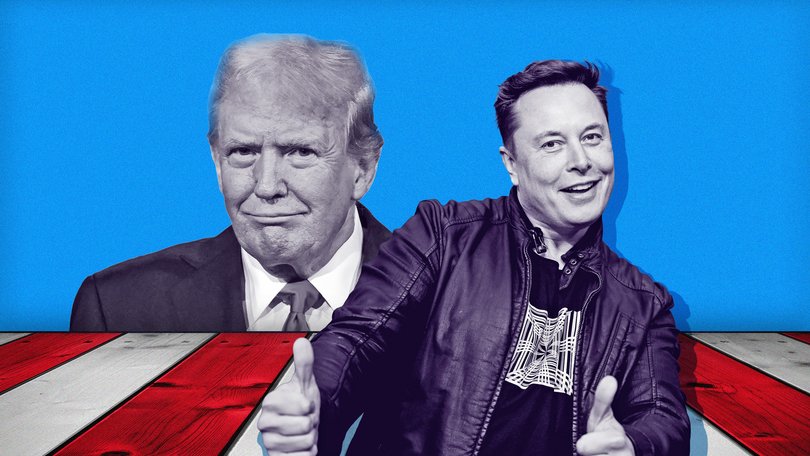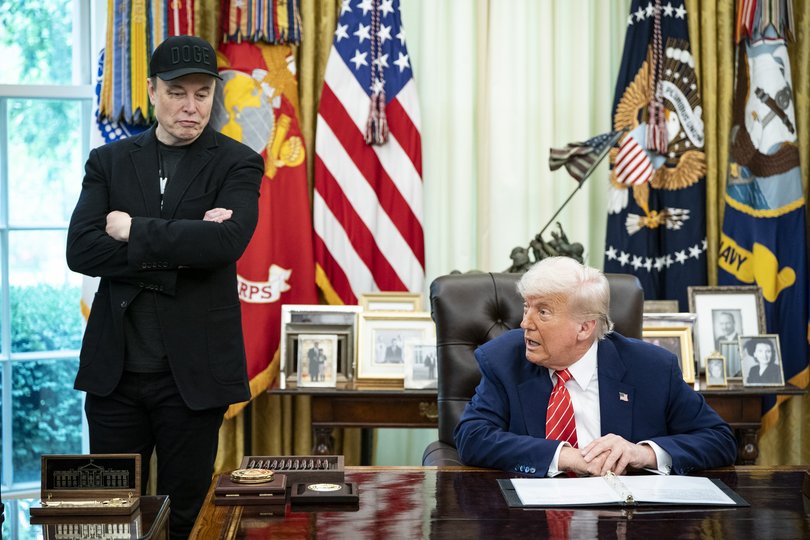THE NEW YORK TIMES: Why Donald Trump’s ‘tech bro’ Elon Musk had to go
THE NEW YORK TIMES: Elon Musk brought the Silicon Valley mantra ‘Move fast and break things’ to Washington. But the main thing he broke was his own reputation.

WASHINGTON — Elon Musk came to Washington with a chain saw and left with a black eye.
Shrinking government is hard, particularly when you do it callously and carelessly — and apparently on hallucinogens.
As with President Donald Trump’s tariffs, the Department of Government Efficiency has created more volatility than value.
Sign up to The Nightly's newsletters.
Get the first look at the digital newspaper, curated daily stories and breaking headlines delivered to your inbox.
By continuing you agree to our Terms and Privacy Policy.A guy who went bankrupt six times doesn’t really care about spending. And Trump certainly didn’t want to see the headline, “Trump Cuts Social Security.”
He just wanted to get revenge on “the bureaucracy” by deputizing Musk to force out a lot of federal employees and give the impression that they were cutting all the waste.
As always with Trump, the former reality star, the impression matters more than the reality, especially the reality of his own sins. This past week, Trump tried to recast the very nature of crime.
As The New York Times’ Glenn Thrush wrote: “President Trump is employing the vast power of his office to redefine criminality to suit his needs — using pardons to inoculate criminals he happens to like, downplaying corruption and fraud as crimes, and seeking to stigmatise political opponents by labelling them criminals.”

It is sickening that the Justice Department is considering settling a wrongful-death lawsuit by giving $5 million to the family of Ashli Babbitt — who was shot on Jan. 6, 2021, by a Capitol police officer when she ignored his warnings and tried to climb through a smashed window into the Speaker’s Lobby in the Capitol.
If Babbitt was trying to help Trump claw back a “stolen” election by breaking into the Capitol, then breaking into the Capitol must be a good thing to do, and any police officer who tried to stop her and protect lawmakers cowering under desks must be in the wrong.
To abet Trump’s fake reality, the craven House Republicans refused to put up a plaque honoring the police officers and others who defended the Capitol that awful day.
I take it personally because my dad spent 20 years as a police inspector in Washington in charge of Senate security. He would run to the House whenever there was trouble. So if on Jan. 6 Mike Dowd had been preventing insurrectionists from assaulting lawmakers, he would now be, in Trump’s eyes, not a hero deserving of a plaque, but a blackguard who was thwarting “patriots,” as Trump calls the rioters he pardoned.
It is a disturbing bizarro world.
Trump was rewriting reality again Friday afternoon as one of the most flamboyant, destructive bromances in government history petered out in the Oval Office.
It had peaked last winter when Musk posted on social platform X, “I love @realDonaldTrump as much as a straight man can love another man,” and again when Trump tried to reciprocate by hawking Teslas in the White House driveway.
But Friday, even these grand master salesmen couldn’t sell the spin that Elon had “delivered a colossal change.”
Musk has acknowledged recently that his dream of cutting $1 trillion had been a fantasy. He said changing Washington was “an uphill battle” and complained that Trump’s “big, beautiful” budget bill, which could add over $3 trillion in debt, undercut his DOGE attempts to save money.
As Trump said, Musk got a lot of “the slings and the arrows.” His approval rating cratered and violence has been directed toward Tesla, a brand once loved by liberals and in China, which is now tarnished.
Musk cut off a reporter who tried to ask about a Times article asserting that he was a habitual user of ketamine and a dabbler in ecstasy and psychedelic mushrooms even after Trump had given him enormous control over the government.
That could explain the chain saw-wielding, the jumping up and down onstage, the manic baby-making and crusading for more spreading of sperm by smart people, and the ominous Nazi-style salutes.
When a reporter asked Musk why he had a black eye, he joked about the viral video of Brigitte Macron shoving her husband’s face. Then he explained that while “horsing around” with his 5-year-old, X, he suggested the child punch him in the face, “and he did.”
The president and the Tony Stark prototype tried to convey the idea that they would remain tight, even though Musk would no longer be getting into angry altercations with Scott Bessent outside the Oval, sleeping on the floor of the Eisenhower Executive Office Building and hanging around Mar-a-Lago. (Trump wants the $100 million Musk has pledged for his political operation.)
Musk, wearing a black “DOGE” cap and black “Dogefather” T-shirt, looked around the Oval, which Trump has tarted up to look like a Vegas gift shop, and gushed that it “finally has the majesty that it deserves, thanks to the president.”
Trump gave Musk a golden ceremonial White House key, the kind of thing small-town mayors give out, and proclaimed: “Elon’s really not leaving. He’s going to be back and forth, I think.” Trump said that the father of (at least) 14 would never desert DOGE completely because “It’s his baby.”
Musk brought the Silicon Valley mantra “Move fast and break things” to Washington. But the main thing he broke was his own reputation.
This article originally appeared in The New York Times.
© 2025 The New York Times Company
Originally published on The New York Times
